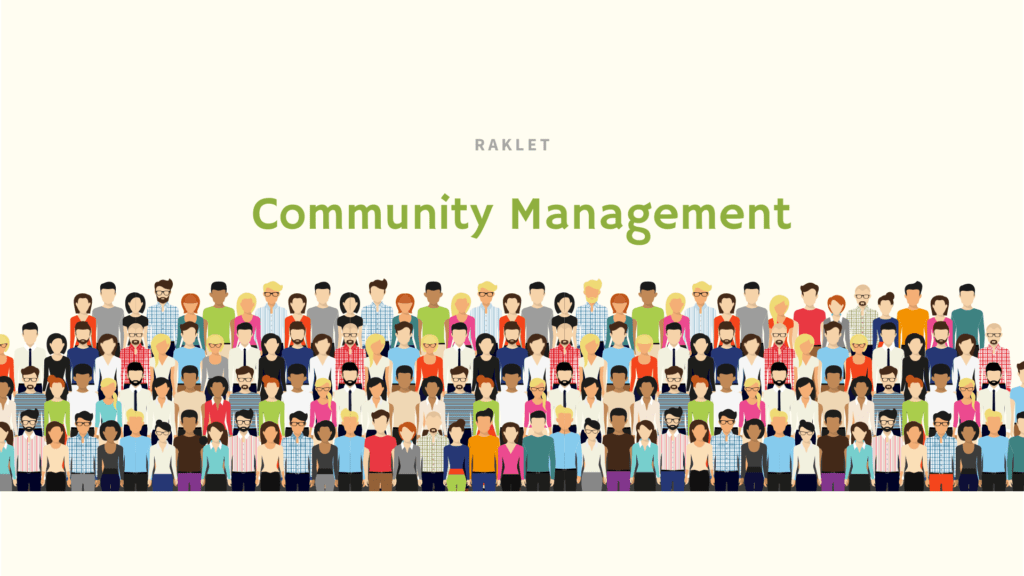In this digital era, where online communities are thriving, community management is an essential part of any effective business strategy. Community management has developed into a potent instrument for encouraging consumer involvement and loyalty as businesses learn the value of establishing meaningful connections with their clientele. To successfully manage a community, it is necessary to employ a wide variety of techniques, such as social media management, content creation, moderation, and customer service.
There is a specific collection of abilities and methods necessary for community management. Managers of online communities need strong interpersonal and communication skills, the ability to diffuse tense situations, and in-depth knowledge of the community’s beliefs and priorities. They also need to know how to use the many online resources to manage and interact with the group efficiently.
In this piece, we’ll delve into the fundamentals of community management and offer a practical set of guidelines to help organizations foster lasting connections with their local communities.
What Is Community Management?
Community management aims to build and maintain connections with people who share common interests. Managing a community boils down to providing a platform where users can interact with one another and the company or brand without fear of rejection.
The administration of online communities calls for a specialized set of skills and procedures to be followed. To be successful in their employment, managers of online communities need strong interpersonal and communication skills, as well as in-depth familiarity with the values and priorities held by their members.
Strong communication and interpersonal skills, the ability to create engaging content, effective moderation, conflict resolution skills, and in-depth familiarity with the needs and motivations of community members are all necessary for successful community management.
The success of online communities is strongly dependent on the management of those communities. Community managers can increase participation, retention rates, and significant outcomes by cultivating engagement and establishing a sense of community among the members of the community. As a consequence of this, any strategy for an online community needs to incorporate resources that are committed to the administration of the community.
Community managers should also be able to write and implement rules that help members interact civilly and constructively. They should be able to track and analyze key performance indicators for the community to pinpoint problem areas and gauge the efficacy of community management initiatives. Community builders and managers can help their businesses or organizations thrive in the long run by utilizing the community management skills discussed here to foster meaningful connections with their user bases, boost participation and devotion, and strengthen relationships with existing customers.
Why is Community Management Important?
An online community manager plays a crucial role in realizing the benefits of a community management strategy, which are essential to the success of any company or organization. Some examples of why community administration is crucial include:
- The positive impact of engagement: Community management fosters a sense of belonging and encourages members to engage with one another, driving conversations and increasing user-generated content.
- Brand loyalty: Through building strong relationships with community members, an online community manager can foster brand loyalty and establish a community that enthusiastically supports and advocates for the brand or organization.
- Customer retention: Businesses and organizations can retain customers by providing a space where they can connect with others and receive support and information through effective community management.
- Exciting opportunities: Community management presents exciting opportunities for businesses and organizations to gain valuable insights into customer needs and preferences. This can help them better understand their target audience and make informed decisions about products, services, and marketing strategies.
- Reputation management: an online community manager can help you manage your brand’s reputation by responding to comments and questions in a timely and open way. This will aid in addressing any concerns and keeping up a good reputation.
An online community manager is a great way to get the most out of community management, which is an important part of any business strategy that works. Managers of online social media channels and communities can help their businesses or organizations grow in the long run by fostering meaningful connections with members, increasing participation and loyalty, and encouraging word-of-mouth advertising.

What Does The Community Manager Do?
A social media manager, a website moderator, or a company’s online community management experts’ clientele are all examples of the types of people with whom an online community manager skills. By creating content, leading discussions, and responding to comments and questions from members, they hope to make people feel like they belong and want to take part. An internet community manager’s primary duties include:
1. Creating Content
Online community managers have the captivating opportunity to create and curate content that is both relevant and engaging to their community members. This includes exciting opportunities for social media efforts like writing engaging blog posts, crafting attention-grabbing social media content, and designing informative newsletters.
2. Moderator
Play a crucial role in online communities by keeping the dialogue on the topic and helping members behave appropriately. This entails keeping an eye on comments and posts, deleting any offensive material, and handling any conflicts that may develop in the Slack community.
3. Engagement
Managers of online communities are tasked with interacting with users and providing open, timely responses to member remarks, customer complaints, and questions. Trust and camaraderie are bolstered, and members feel more included as a result.
4. Metrics tracking
Metrics Online community managers should monitor and evaluate community metrics like engagement rates, traffic, and sentiment analysis to evaluate the success of their strategies and make adjustments as needed.
5. Strategy development
Setting goals, defining key performance indicators, and developing tactics to accomplish those goals can all fall under the purview of an online community manager.
A dedicated community organizer is essential to the success of any online group. Engagement, brand loyalty, and long-term success for their company or group by using their skills and knowledge in content creation, moderation, engagement, metric tracking, community guidelines, and strategy development.
Best Community Apps of 2023
In 2023, custom mobile apps have become a must-have for businesses and organizations seeking to foster engagement, loyalty, and community around their goods and services. These apps can be changed to fit the needs of each community, and they can offer a wide range of features that make it easier for people to talk to each other, share information, and work as a team.
Slack is the best community app of 2023. Slack is a widely used messaging app with many useful tools for building and maintaining online communities. It’s perfect for companies and groups that want to foster an engaged fan base by facilitating real-time communication, file sharing, and project collaboration.
Discord is another excellent example of a community-focused custom mobile program. Discord is a messaging app that was initially made for the gaming community but has since grown to serve other groups as well. It allows users to create channels for various topics, share files, and communicate in real-time, making it an ideal tool for communities that want to remain connected and engaged.
Another well-known community-creating mobile tool is Facebook Groups. Facebook Groups provide a secure forum for companies and other organizations to facilitate internal communication, content sharing, and project collaboration amongst members. It’s a great resource for companies and groups that want to create a following for their company on the most popular social media platform in the world.
Finally, Mighty Networks is an excellent example of a community-specific mobile program. With Mighty Networks, companies and groups can set up their own mobile- and desktop-friendly community platform under their own name. Chat, forums, and video sharing are just some of the community-friendly features available.
These aren’t the only community apps that will create waves in 2023, though. In 2023, these will be the best community applications to use:
However, these two community applications are not the only ones that will make a splash in the year 2023. These will be the finest community applications available to use in the year 2023:
- Raklet – All-in-one platform to grow your audience
- Clubhouse
- Nextdoor
- Strava is a social networking application for cyclists
- Untappd is an application for social networking that is geared toward beer connoisseurs.
- Shapr is a mobile application for business networking.
- Slowly is a digital pen pal that connects users all over the globe.
- Bumble is a dating program that places an emphasis on the independence and protection of women.
- Peanut is a social networking application geared specifically toward mothers.
- Fishbrain is a social networking application geared specifically toward anglers.
It is anticipated that by the year 2023, these community applications will provide users with a safe, interesting, and entertaining atmosphere in which to meet new people who share their interests.
Why Should You Use Community Management Software?
Effective community management is essential to establishing and sustaining rapport with your target audience’s demographics. Managing a community and talking to its members can help spread the word about a company, get people excited about it, and ultimately bring in more money.
In addition, the time and effort of community managers can be reduced because of the software’s efficient task administration. Scheduling events, managing member data, and monitoring member engagement are all examples of administrative chores that can be automated, freeing up time for more strategic endeavors. By tailoring each member’s experience to their specific preferences, the program boosts participation rates. Managers of online communities can use this to learn more about their members, cater to their particular interests, and keep more of them happy and engaged.
Community management can be hard and take a lot of time, though, if you have a large and active audience. Software designed specifically for managing online communities can help administrators save time and improve the quality of their contact with users. You should seriously contemplate using community management software because of the following reasons:
1) Effective Management
All of your contact channels, such as social media, email, chat, and forums, can be managed from a single location with the help of community management software. This makes it easier for you to handle the messages, comments, and questions that come in from your community members.
2) Planning
Many of the mundane, time-consuming chores that come with managing a community, such as scheduling posts and moderating comments, can be automated with the help of community management software. This lets you put your energy into more productive pursuits, like making new material and interacting with your audience.
3) Interacting with your audience
This lets you put your energy into more productive pursuits, like making new material and interacting with your audience. Insights and analytics: Community management tools can help you learn more about the habits and preferences of your user base. You can learn more about your target demographic, fine-tune your content and user engagement tactics, and give your community members a better experience as a result.
4) Working Together
The ability to work together on community management duties and maintain a unified tone and voice is a huge benefit of using community management software. This is crucial if your community is big or if there are several people on your team who have a hand in managing the community.
5) better member experience
Increased involvement, loyalty, and advocacy can result from a better member experience, which can be achieved with the help of community management software. In the long run, this can propel company expansion and help you realize your objectives.
What Kind of Community Management System is Right for You?
There are a lot of community management systems out there, so picking the right one can be difficult. Considerations such as community size and complexity, available funds, and desired outcomes for community management should all be taken into account when deciding on the best method. When picking a CMS for your online community, keep these things in mind:
Functions and features
Each CMS has its own set of tools and options for managing online communities. Others may offer more advanced analytics or moderation tools for communities, while still others may focus on managing social media. Take your unique requirements for community administration into account and search for a solution that can fulfill those needs.
User interface:
The user interface of a community management system should not be overlooked, as it has the potential to significantly affect the system’s usability and productivity. Finding a system with a simple and straightforward user interface will help you save time and increase output.
Scalability is a key factor to think about if you want your group to expand over time. Find a system that can grow with your needs for community management without making you change the way you do things now.
Integration
When it comes to community management, it can be helpful to integrate with other tools and platforms for the sake of streamlined processes and unified messaging. It’s important to find a platform that works well with your existing tools, such as your email marketing software, social media sites, and customer relationship management software.
Best practices community management
Look for a community management system that follows best practices, like having powerful tools for moderation, encouraging participation and discussion, and giving data analyses and insights. Building and maintaining a successful community requires a structure that follows these guidelines.
If you want to manage your online community effectively, you need to start with a proper community management system. You can choose a system that works for you and helps you create a strong and engaged community by thinking about your specific needs and goals and considering factors like features, user interface, scalability, integration, cost, and community management best practices.

What are the top 5 Benefits of a Community Management System?
There are many advantages to managing an online group with a community management system. The top five reasons why you should use a community management application are as follows:
1. Improved community engagement
One benefit of a good community management system is that it improves your ability to interact with and contribute to your online community. If you do it this way, you can strengthen your connections with the people who make up your community and inspire them to get involved more often.
2. Workflow simplification:
A community management tool can help simplify your work by giving you one place to oversee all of your communities’ actions. Time is conserved, and mistakes and wasted effort are avoided or minimized, respectively.
3. Better moderation
Moderation is an integral part of managing an online community, and a community management system can equip you with robust moderation tools to keep your community friendly and secure.
4. Enhanced analytics:
A better grasp of your online community’s performance and the ability to pinpoint problem areas require improved analytics. Metrics like member involvement, sentiment, and activity on social media accounts can all be monitored with the help of analytic features provided by a community management tool.
5. Better scalability:
Keeping track of a rapidly expanding online group can be a headache. By offering resources for automation, delegation, and collaboration, a community management system can help you grow your community management group activities more efficiently.
How Much Does Online Community Management Software Cost?
VOnline community management software costs can range from free to several thousand dollars, based on the features and capabilities you require and the size of your community. Community management software can cost anywhere from free to several thousand dollars a month.
The return on investment (ROI) of a community management tool should be factored into the overall expense of the tool. You can save time and effort, boost participation, and learn more about your community members’ habits and preferences with the aid of a good community management tool. Gains in revenue, customer retention, and company prestige are all possible outcomes.
Moreover, costs associated with training, assistance, and implementation should be calculated alongside the price of the community building and management tool itself. While some community management software requires extensive training and orientation, others provide a more straightforward UI.
The value of a community administration tool should be compared with the money spent on it. Better results for both the community and the various business partners can be achieved through increased efficiency and efficacy in community management thanks to the use of a high-quality community management tool.

How to Monetize a Community
Monetizing a group is one way to ensure its continued success and development, as well as to offer members additional benefits. However, monetization must be approached with caution, taking into account the wants and requirements of the community as a whole. Some proven approaches to how to monetize a community are detailed below.
- Membership: Membership fees are one of the simplest ways to make money off of a group of people. In exchange for a recurring membership fee, a service’s paying customers to gain access to unique benefits and features that aren’t accessible to the general public. This method is successful in groups where members are dedicated to the cause and are ready to pay for exclusive content or services.
- Advertising: For communities with a sizable and active user base, advertising is a typical means of generating revenue. Marketers can partner with community administrators to have their ads displayed within the community, reaching a highly specific and interested demographic.
- Sponsorship: Sponsorship is a win-win for both the community and the advertiser, making it an excellent method for monetizing online groups. Sponsors can collaborate with community managers to develop unique content, events, or products that speak to the community’s values and interests while also benefiting the sponsors.
- Affiliate marketing: Community managers can make a commission by recommending useful products and services to their members through affiliate marketing. Managers of online communities can earn commissions on product sales made through partnerships with businesses that provide goods and services of interest to their members.
E-commerce: E-commerce Online retailing is yet another successful strategy for making money off of a community. Managers of online communities can capitalize on their members’ shared passions by opening up virtual shops stocked with related goods. Products that cater to the preferences of the community can be either digital (such as e-books, courses, and webinars) or physical.
Donation: Members can help a group thrive by donating to its cause. Community managers can solicit donations to finance community-beneficial projects or to support ongoing community efforts.
Features To Look For in Community Management System
It is crucial to select a community administration system that accommodates your community’s unique requirements. What to look for in a good community administration system:
1. Any community management system needs to have user control tools. You should be able to control who has access to what, what privileges they have, and how they behave within the system.
2. To create a robust and active community club or group, engagement tools are essential. Look for options like forums, chat rooms, and secret messaging that make it simple for community members to connect with one another and work together.
3. Monitoring and analytics tools allow you to assess how well your social media channels and community management initiatives are going and where adjustments need to be made. Metrics like user participation, content effectiveness, and group expansion can all be monitored with these tools.
4. Integrations with external tools and platforms can enhance the efficiency and functionality of your community management plan administration processes. Search for a community management system that can connect with your existing customer relationship management (CRM) software, social media platforms, and email marketing platforms.
5. In today’s digital world, mobile compatibility is more and more crucial anywhere. A community administration system needs to be mobile-friendly and have a responsive design.
Last Words on Community Management
In conclusion, if you want your online community to thrive, it’s important to use the correct community management system. Knowing what to look for in a community management system will help you choose the right one for your community’s needs and goals.
Below the major categories, you’ll find more in-depth instructions with step-by-step guides for managing a community. This environment is conducive to the comprehension of the Community Management System.
Some of these features are tools for managing users, ways to get people involved, reporting and analytics tools, integrations with other platforms, and the ability to work on mobile devices.
Could create an active online group that encourages participation, teamwork, and interpersonal connections by following the advice in this manual. If you’re looking for a comprehensive guide to community administration that will help you make a positive difference in your area, this guide is perfect for you.
This guide has taught me a lot about community management by explaining best practices, benefits, and important things to think about when choosing a community management tool. Whether you’ve managed online communities before or are just starting to, you’ll find useful information and advice in this book.
Best Online Community Management Software: Raklet

Now that you know the benefits of an online community and how to build it from scratch, the next step is picking the best community software according to your needs.
As we have mentioned before, good community software will make this challenging process of launching a community much easier. If you pick the right software, it will organize and list all the important membership data for you, have membership tiers, a social network, and much more.
You certainly do not need to do everything manually, and using software like Raklet will help your community grow much easier. Raklet is an all-in-one community management software that helps communities all around the world make meaningful connections and have unique experiences.
With Raklet’s many features such as customizable forms, social networks, tags, and categories, it will be easy to create a unique experience for your members in accordance with your brand values. Check out our community software page for more information!
If you’d like to learn more about Raklet or if you have any questions, you can also schedule a demo. We would love to explain more about how you can launch your community with Raklet, our platform, and what we do to help communities all around the world.
For more articles about building a community and further tips & tricks, check out these links below:







